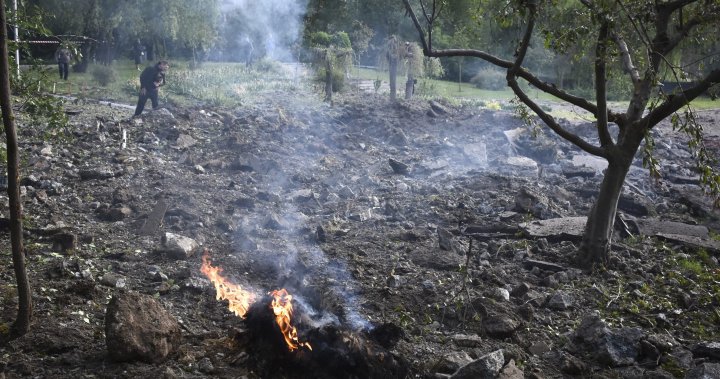Calls are growing from U.S. lawmakers and former government officials urging the Biden administration to allow Ukraine to strike military targets within Russia with U.S.-supplied weapons, despite fears that doing so risks escalating the war with Moscow.
Russia has been bombarding Ukraine with air assaults and missiles originating from the Russian mainland that have destroyed critical infrastructure as well as military targets. At the same time, Russian forces have launched a fierce offensive along the eastern border, which Ukraine’s depleted forces are struggling to repel.
A Russian missile attack on Kharkiv — Ukraine’s second-largest city, which has been under siege in recent weeks — killed at least seven people early Thursday.
The U.S. began supplying long-range missile systems, known as ATACMS, earlier this year, before Congress approved US$60 billion in new military and financial aid following months of delay. The bill included a provision forcing the Biden administration to send Ukraine additional ATACMS, which have long been sought by Kyiv.
Gen. Charles Q. Brown, chair of the U.S. Joint Chiefs of Staff, said during a discussion hosted by the Atlantic Council that Ukraine already has the capability to strike Russian targets — just not with U.S.-supplied weapons.
He declined to say whether that will change.
“We will continue to have dialogue on this,” he said.

Ukraine has attacked some Russian military and energy facilities with drones and long-range Storm Shadow cruise missiles supplied by the United Kingdom. U.K. Foreign Secretary David Cameron said this month that Ukraine has the right to hit back at Russia with London-supplied weapons “just as Russia is striking inside Ukraine” with weapons from Iran and North Korea.
But as Moscow increases its aerial assaults and presses ahead not just in the east but also against the northern city of Kharkiv, the chorus of voices calling for the Biden administration to allow Ukraine to hit back with U.S. weapons is getting louder.
“What the Americans have done … is given the Russians a sanctuary,” Bill Taylor, a former U.S. ambassador to Ukraine, told Global News last week. “The Ukrainians ought to be able to shoot back in self-defence.”
The email you need for the day’s
top news stories from Canada and around the world.
On Monday, a bipartisan group of congressional lawmakers wrote a letter to U.S. Defense Secretary Lloyd Austin calling for, among other things, authorizing the use of U.S.-supplied weapons to strike “strategic targets” within Russian territory “under certain circumstances.”
“Ukrainians have been unable to defend themselves due to the Administration’s current policy,” the letter signed by 13 U.S. House members reads. The letter was sent by Republican Rep. Mike Turner, who leads the House Intelligence Committee.
“It is essential the Biden Administration allows Ukraine’s military leaders an ability to conduct a full spectrum of operations necessary to respond to Russia’s unprovoked attack on their sovereign land.”
In an interview with ABC News on Sunday, Victoria Nuland, who recently retired as a top U.S. State Department official and previously served as an ambassador to NATO, said it was “time” to allow Ukraine to strike Russian bases where the attacks are coming from.
“I think if the attacks are coming directly from over the line in Russia, that those bases ought to be fair game, whether they are where missiles are being launched from or where they are … being supplied from,” she said.

The ATACMS sent to Ukraine by the U.S. this spring have a range of up to 300 kilometres, a distance that allows Kyiv to strike deep into Russian territory without needing to advance further. A shorter-range version of the system sent to Ukraine last year was unable to reach the Russian border from the front lines, but could strike within Russian-held areas of Ukraine, including the Donbas and Crimea.
Unlike the U.K.-provided Storm Shadow missiles, the long-range ATACMS fire ballistic missiles that don’t follow a straight flight path, making them difficult to impossible to take down with traditional air defence systems.
The Institute for the Study of War, a Washington-based think tank, said in an assessment late Monday that allowing Ukraine to hit Russian targets would allow it to destroy mobilized troops massing along the border ahead of a continued offensive push.
“These U.S. and Western policies are severely compromising Ukraine’s ability to defend itself against current Russian offensive operations in northern Kharkiv (region) or any area along the international border where Russian forces may choose to conduct offensive operations in the future,” the assessment said.
Brown told reporters Monday he is confident no ATACMS missiles have been used against targets within Russia.
Asked about comments made by Nuland and others, Brown and Austin said Ukraine should be focused on the “close fight” within its borders.
“Our expectation is that they continue to use the weapons that we’ve provided on targets inside of Ukraine,” Austin said after he and Brown met with the Ukraine Defense Contact Group, which co-ordinates military aid to Ukraine among international partners.
The pair did say they believe Ukraine has the right to us U.S.-supplied weapons to strike Crimea, which Russia unlawfully annexed in 2014 and was previously a red line for the Biden administration.

On Tuesday, Ukraine said it destroyed the last Russian warship armed with cruise missiles that was stationed off Crimea over the weekend in a long-range attack.
Although there was no immediate comment from the Kremlin confirming the strike, the Russian defence ministry said on Sunday that its forces had shot down nine U.S. ATACMS missiles over Crimea.
The supply of ATACMS and other long-range missiles by Ukraine’s allies, as well as Cameron’s comments, prompted Russia to announce it would begin drills on the deployment of tactical nuclear weapons. Those drills began on this week, the defence ministry said Tuesday.
Experts believe Russia is unlikely to actually use nuclear warheads on the battlefield, and that the drills are another example of aggressive diplomacy.
Other western nations have resisted sending Ukraine capabilities for striking Russia. German Chancellor Olaf Scholz has so far refused appeals from Ukrainian officials to provide Taurus missiles, which are equipped with stealth technology and have a range of up to 500 kilometres.
The German- and Swedish-made missiles would be able to reach targets deep in Russia from Ukrainian soil. But Berlin has balked at that prospect, saying that sending the missiles would bring a risk of it becoming directly involved in the war.
— with files from The Associated Press





